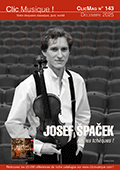 Le grand pianiste chinois Yuan Sheng, déjà remarqué pour un très bel enregistrement des Variations Goldberg, nous livre ici quelques une des pièces les plus emblématiques de l’oeuvre pour piano seul de Schumann. Particularité notable : il joue sur un instrument d’époque, un piano Streicher de 1846. Oubliez donc les sonorités graves et amples des pianos modernes (on est plus proche d’Andreas Staier sur Érard que de Dana Ciocarlie sur Yamaha) ou la fougue romantique de la mythique version d’Arturo Benedetti Michelangeli — mais la qualité de l’interprétation est indubitable. Une fois l’oreille faite à la sonorité du Streicher (et à la prise de son un peu sourde), on se laisse emporter par un langage d’une constante clarté et un toucher aussi vif qu’inventif. Un premier CD contient les Davidbündlertänze, suivies de l’incontournable Carnaval. Dans ces miniatures, sous-titrées « scènes mignonnes sur quatre notes », Sheng se fait tour à tour joueur ou virtuose, et devient parfois réellement émouvant (écoutez sa Chiarina !). Un second CD nous gratifie d’une interprétation des Kinderszenen suivies du Fa- schingsschwank aus Wien (Carnaval de Vienne) et des Waldszenen, complétant ce florilège de pièces courtes et contrastées, un genre dans lequel Schumann excella plus que tout autre. (Walter Appel)  Five major piano cycles of early Romanticism, newly recorded by a major exponent of historically informed keyboard playing. Acclaimed as China’s ‘premier interpreter of Bach’ by International Piano Magazine, the Chinese pianist Yuan Sheng has gained international recognition through his performances in the US and China, among many other countries. The New York Times praised Sheng’s performances of Bach as ‘models of clarity, balance and proportion’. His discography on Piano Classics includes several of the composer’s major cycles such as the Goldberg Variations (PCL0042) and Partitas (PCL10126) which have won critical acclaim for their agile rhythms and sensitive touch, informed by a profound understanding of the music’s origins for harpsichord and the expressive potential of its transfer to the modern piano, which he now passes on to students as a professor of piano at the Central Conservatory of Music in Beijing. This depth of study and beauty of sound, informed by intensive study with Rosalyn Tureck, also mark out his newly recorded interpretations of five major piano cycles by Robert Schumann, who along with Chopin did more than any other composer to expand the horizons of the piano in the early decades of the 19th century and position it as the supreme articulation of a Romantic composer’s ambition in the hands of a single performer. Thus the present album makes an essential complement to Yuan Sheng’s extensive collection of Chopin’s work (including the Ballades, Impromptus, Preludes and 20 Nocturnes: PCL0049) issued by Piano Classics in 2013. While Sheng’s Chopin was recorded on an 1845, he returns to a modern Steinway for this Schumann without sacrificing the freedom of expression and lightness of touch which marked out the previous album. From the Davidsbündlertänze of 1837 through to the Waldszenen of 1849, the collection surveys the peaks of Schumann’s piano writing with a concentration on the composer’s gift for distilling a mood within a miniature. This mood-painting reaches its height in the seventh movement of Waldszenen which became an avatar of Romanticism, ‘Der Vogel als Prophet’, connecting worlds as seemingly distant as Rameau and Messiaen.
 |
